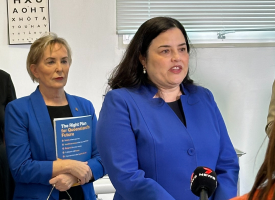AMA key advocacy wins during 2017
<p>The AMA constantly advocates on behalf of general practitioners and rural health. The AMA has been successful in a number of policy areas.</p>
AMA Key Advocacy Wins 2017
It was a very busy and very successful year for the Federal AMA in 2017. Your elected representatives and the hardworking staff in the Secretariat in Canberra delivered significant achievements in policy, advocacy, political influence, professional standards, doctors’ health, media profile, and public relations.
We worked tirelessly to ensure that health policy and bureaucratic processes were shaped to provide the best possible professional working environments for Australian doctors and the highest quality care for our patients.
General Practice and Workplace Policy
- Our strong advocacy led to a decision to lift the freeze on Medicare patient rebates.
- The AMA coordinated Doctors' Health Services around the country, with funding support from the Medical Board of Australia.
- We launched the AMA Safe Hours Audit Report, giving added focus to the issue of doctors’ health and wellbeing.
- We maintained a strong focus on medical workforce and training places, with the National Medical Training Network significantly increasing its workforce modelling and projection work following sustained advocacy by the AMA.
- We secured a number of concessions in the proposed redesign of the Practice Incentive Program (PIP), as well as a delay in the introduction of changes.
- We lobbied at the highest level for a more durable solution to concerns over Pathology collection centre rents, focusing on effective compliance, and achieving a fair balance between the interests of GP members and pathologist members.
- The AMA led the reforms to After-hours GP services provided through Medical Deputising Services (MDSs) to ensure that these services are better targeted and there is stronger communication between the MDS and a patient's usual GP.
- We successfully lobbied the ACCC to renew the AMA's existing authorisation that permits GPs to engage in intra-practice price setting, potentially saving GPs thousands of dollars annually in legal and other compliance costs.
- We ensured a proportionate response from the Government in response to concerns over the security of Medicare card numbers, avoiding more draconian proposals that would have added to the compliance burden on practices, and added a barrier to care for patients.
Medical Practice
- We fundamentally altered the direction of the Medical Indemnity Insurance Review, discussing its importance to medical practice at the highest level, helping to ensure the review is not used as a blunt savings exercise, and saving doctors and their patients millions of dollars in increased premiums.
- We led a nationally co-ordinated campaign with the State AMAs and other peak bodies to uphold the TGA’s decision to up-schedule Codeine.
- We campaigned against an inadequate, poorly conceived, and ideological National Maternity Services Framework, which has now been scrapped.
- We campaigned on the issue of Doctors’ Health and the need for COAG to change mandatory reporting laws, promoting the WA model.
- We launched the AMA Public Hospital Report Card.
- We pressed the case for vastly improved Private Health Insurance products through membership of the Private Health Ministerial Advisory Committee (PHMAC), my annual National Press Club Address, an appearance before a Senate Select Committee, and regular and ongoing media and advocacy.
- We launched the AMA Private Health Insurance Report Card.
- We successfully convinced the Government to address concerns with the MBS Skin items, and will continue to do so with the MBS Review more broadly.
- We successfully lobbied for changes to the direction of the Anaesthesia Clinical Committee of the MBS Review.
- We launched a new AMA Fees List with all the associated benefits of mobility and regular updates.
- We saw a number of our Aged Care policy recommendations included in a number of Government reviews.
- We lobbied against the ill-thought-out Revalidation proposal, which resulted in a vastly improved Professional Performance Framework based around enhanced continuing professional development.
- The AMA successfully held off the latest attempt to have a non-Medical Chair of the Medical Board of Australia appointed.
Public Health
- We launched the AMA Indigenous Health Report Card, which focused on ear health, and specifically chronic otitis media, in conjunction with the Minister for Indigenous Health, The Hon Ken Wyatt AM.
- We led the medical community by being the first to release a Position Statement on Marriage Equality, and advocated for the legislative change that eventuated in late 2017.
- We released the updated AMA Position Statement on Obesity, following a policy session at the AMA National Conference, which brought together representatives from the medical profession, sports sector, food industry, and health economists.
- We launched the AMA Position Statement on an Australian Centre for Disease Control (CDC), which was welcomed by experts in communicable diseases.
- We released the AMA Position Statement on Female Genital Mutilation, which provided a platform for the AMA to engage in advocacy on preventing this practice.
- We released the AMA Position Statement on Infant Feeding and Maternal Health.
- We released the progressive and widely-supported AMA Position Statement on Harmful substance use, dependence, and behavioural addiction (Addiction).
- We successfully lobbied against the proposal to drug test welfare recipients, including a strongly worded submission to a Parliamentary Inquiry on the proposal, which resulted in defeat of the proposed measure in the Parliament.
- We released the AMA Position Statement on Firearms, generating considerable media coverage and interest, in Australia and overseas. Most importantly, it is a factor in Australia maintaining its tough approach to gun control.
- We released the AMA Position Statement on Blood Borne Viruses (BBVs), which called for needle and syringe programs (NSPs) to be introduced in prisons and other custodial settings to reduce the spread of BBVs. This policy has been promoted by other health organisations and saw the AMA create strong ties within the sector.
- We conducted ongoing and prominent advocacy for the health and wellbeing of Asylum Seekers and Refugees, including a meeting with the Minister for Immigration and Border Protection, The Hon Peter Dutton MP, and lobbying on behalf of individual patients behind the scenes.
- AMA lobbying of manufacturers saw a change to the sale of sugar-sweetened beverages in some remote Aboriginal communities, which will improve health outcomes.
- We promoted the benefits of Immunisation to individuals and the broader community. Our advocacy has contributed to an increase in child and adult vaccination rates.
- We provided strong advocacy on climate change and health.
- We consistently advocated for better women’s health services.
- The AMA lobbied for the establishment of a No-Fault Compensation Scheme for people adversely affected by vaccines.
A major activity was promotion of our carefully-constructed Position Statement on Euthanasia and Physician Assisted Suicide during consideration of legislation in Tasmania, Victoria, NSW, and WA.
The Federal Council endorsed Position Statements on Mental Health, Road Safety, Nutrition, Organ Donation and Transplantation, and Rural Workforce, ready for release in early 2018.
The AMA President had face-to-face meetings with Prime Minister Malcolm Turnbull, Opposition Leader Bill Shorten, Health Minister Greg Hunt, Shadow Health Minister Catherine King, Greens Leader Dr Richard Di Natale, and a host of Ministers and Shadow Ministers.
The Secretariat also organised lunch briefings with backbenchers from all Parties to promote AMA policies.
In July, our advocacy was publicly recognised when the Governance Institute rated the AMA as the most ethical and successful lobby group in Australia.



